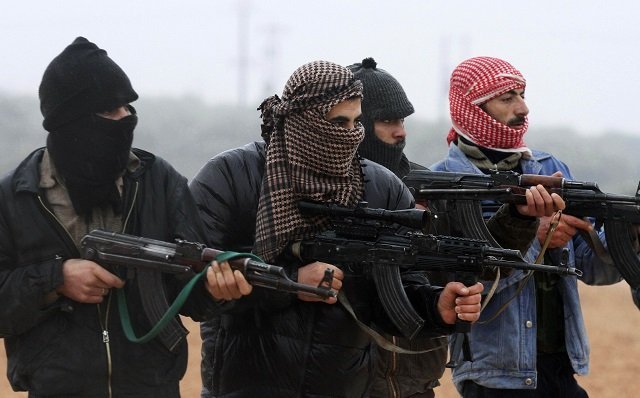Source: The Washington Post – by Loveday Morris (As Islamist rebels rise in Syria, liberal activists take a step back)
Two years ago as he hung cuffed to a wall in one of the Syrian intelligence service’s notorious detention centers, Anas Ghaibeh couldn’t have imagined a day when he’d doubt whether the regime should fall immediately. But now he says, he’s not so sure.
Like many youth activists who took to the streets to demand President Bashar al-Assad’s ouster in the spring of 2011, Ghaibeh, who is 28, says he feels as though the revolution has been hijacked, with al-Qaeda-linked foreign fighters playing an increasingly prominent role in challenging government forces. If the regime falls today, it is likely to bring only more chaos and bloodshed, he says, a difficult admission for someone who has already sacrificed so much in seeking its end.
As the war has progressed, many of the young liberals who organized protests and beamed their images to the world as the winds of change first reached Syrian soil more than two years ago complain that they have been marginalized. They now have to fight on two fronts, they say — not just against the government, but also against extremist Islamist rebel groups, which, despite their supposedly shared aims, are increasingly targeting secular activists.
At a protest in Aleppo last week, demonstrators demanded the release of several activists detained by the Islamic State of Iraq and the Levant, the newly expanded al-Qaeda in Iraq. The squeezing out of moderates is playing into the argument of Assad’s supporters that the only choice facing Syria is between his rule and that of Islamic extremists, says Mustafa Haid, the Beirut-based director of Dawlaty, a nonprofit group that has provided training for more than 100 activists since being established last summer.
“We’ve lost many political activists,” said Haid, including some who were killed, others who joined the secular-leaning Free Syrian Army and others who fled Syria for Lebanon or other havens. “They are confused and say, ‘It’s not my revolution any more.’?”
Ghaibeh was arrested by Syrian military intelligence in the summer of 2011, and his voice cracks with emotion as he talks about the harsh treatment he endured during five weeks in Syrian custody. He says he was made to stand for days on end, whipped with electrical wire and beaten on the soles of his feet. But the hardship only galvanized him, he said, making him more determined in his cause.
“I was just thinking of one thing,” he said. “That I’d be out one day and I’d be back on the street doing demonstrations. They wanted me to be silent, didn’t want to give them what they wanted.”
But Ghaibeh eventually fled to Beirut in March 2012. From outside Syria, Ghaibeh has continued to participate in demonstrations in support of the Syrian opposition, but he says the increasingly muddied makeup of the opposition has shifted his focus toward working with refugees and away from political activism.
“We need freedom but not like this,” Ghaibeh lamented as he sat in a coffee shop in central Beirut, the capital of neighboring Lebanon, where many of Syria’s secular activists have escaped.
“I’m still against the regime, but now if you think about the fall of the regime, it’s dangerous. The Islamists, the jihadis, they have stolen our revolution.”
In more idealistic days in the spring of 2011, Ghaibeh, then a student at the capital’s Arab International University organized protests in Damascus’s up-market neighborhood of Mezzah with a group of friends.
The first involved no more than a few dozen people and lasted 30 seconds or a minute — the thrill of showing defiance against the state, their confidence buoyed by the progress of the Arab Spring in Tunisia, Egypt and Libya. His arrest came in August 2011 after a protest in which he stood on the front line and led anti-government chants.
Now Ghaibeh says he believes that what would be best for Syria might be a political compromise, one that could even allow Assad to stay in office, though with diminished powers.
He said the activists he trains are becoming increasingly frustrated, and he worries that some are becoming increasingly hard-line.
“I feel upset to see more and more of them becoming radical in their views, in their social media posts,” he said. Another activist, a 22-year-old from Damascus with bleached-blond hair, said that in the early days of the revolution he would never have imagined himself to be an advocate of a group such as Jabhat al-Nusra, designated as a terrorist organization by the United States.
“I thought they were bad people,” said the activist, who would give only his first name, Mahmoud, for security reasons. “But after what I’ve seen from them, I’ve changed my mind. They are Islamic, but they work with the Free Syrian Army. The Syrian regime portrays them as terrorists, but they are good people.”
However, even Mahmoud said he regarded the growing role being played in Syria by allies as of al-Qaeda as the biggest threat to the secular opposition. The groups include foreign fighters under the umbrella of a group that calls itself the Islamic State of Iraq and the Levant, an expansion of what was once known as al-Qaeda in Iraq.
Those groups’ involvement, Mahmoud said, can lead only to an escalation of infighting among rebel groups and to wider Western uneasiness about providing arms for the anti-government rebels.
The other activist, Ghaibeh, said he might return to political activism if he can find a group whose aims are in the best interests of the country. For now, he busies himself with the needs of more than 670,000 of his fellow Syrians who have fled to Lebanon, and he says he continues to hope for the day when Syria will achieve a secular democracy.
“You have to have hope,” Ghaibeh said. “If we are hopeless, it would be surrender.”



COMMENTS